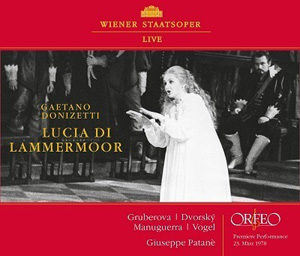With dozens of good recordings of this opera currently available, this release, recorded live in Vienna in 1978, is notable for being a document of soprano Edita Gruberova’s first Lucia. (There are three other recordings of her Lucia–from 1983, 1991, and 2002.) Gruberova is the center of a huge cult following in Munich (and elsewhere), where in July her 50 years of singing there was celebrated with a gala concert; the ovation lasted for an hour. She will sing Lucia next year in Budapest, 41 years after her debut in the role. Due to her status as icon, one must admit that the last 10 to 15 years her concerts and opera performances have been as close to “events” as were Pavarotti’s late work. The voice, always somewhat glassy, is no longer totally reliable, the bottom even weaker than it was at her peak.
Half stimme diva and half kunst, despite being neither Sutherland nor Callas, she rarely disappoints. She is, indeed, a great singer and a great Lucia, and here, in her youthful prime, she can do no wrong. Her fantastic technique, on-the-button notes from high B-flat upwards, might put her in the canary category, but she is also a stage creature, a soprano who sings off the text. One hears greatness–and intelligence–from her opening words, and she delivers a stupendous “Regnava nel silenzio” with trills galore and Cs and D-flats blazing. She’s lovely and fragile in the duet with Edgardo, angry, and then pitifully broken in the duet in which her brother bullies her into the wedding. And she rages in the stretta to the Sextet. Her Mad Scene is startlingly sung and vocally acted, with every note (save for the first E-flat, which starts south of pitch but recovers) just about perfect.
Her fellow Slovak Peter Dvorsky, a fine lyric tenor, is Edgardo. Passionate, with a voice of the right weight and color, he suffers from pitch issues in Act 1 (this was true of other performances I heard him in as well), mostly, unfortunately, at the top of his range. This issue clears up in a superb, no-holds-barred Wolf’s Crag Scene and a gorgeous, warmly voiced, final aria. The wretched Enrico is sung by the under-rated and under-recorded Matteo Manuguerra, whose burly sound and gritty delivery capture the character ideally. And he matches Dvorsky in the Wolf’s Crag scene in what almost becomes a fist fight.
German bass Siegfried Vogel is Normanno (shorn of his scene with Lucia near the start of Act 2) and very touching in his narrative after the murder, albeit with a dusty voice. Thomas Moser–later a Tristan and fine Mozartean–sings Arturo well enough. Giuseppe Patané leads with an ear toward the singers’ needs and whips up a storm when he must. The stereo sound is good enough to be a studio recording and the Viennese audience remains gagged until the end of scenes, some arias, and acts, when they break loose like people enjoying themselves. This is a terrific Lucia, a must for Gruberovoids, of course, and a good addition to the necessary Callas (Berlin ’55) and Sutherland recordings.
































